Social Research: Teacher Appraisal Based on Student Outcomes
VerifiedAdded on 2023/06/03
|5
|1105
|96
Essay
AI Summary
This essay delves into the complex debate surrounding the use of student learning outcomes as a primary source of evidence for teacher appraisals. It presents arguments both for and against this practice, exploring the potential benefits of increased teacher accountability and motivation, as well as the potential drawbacks of unfairly penalizing teachers for factors outside their control. The essay references various studies and perspectives on teacher evaluation, professional development, and the impact of teaching quality on student success, ultimately highlighting the need for a balanced and comprehensive approach to teacher appraisal that considers multiple factors beyond student test scores.
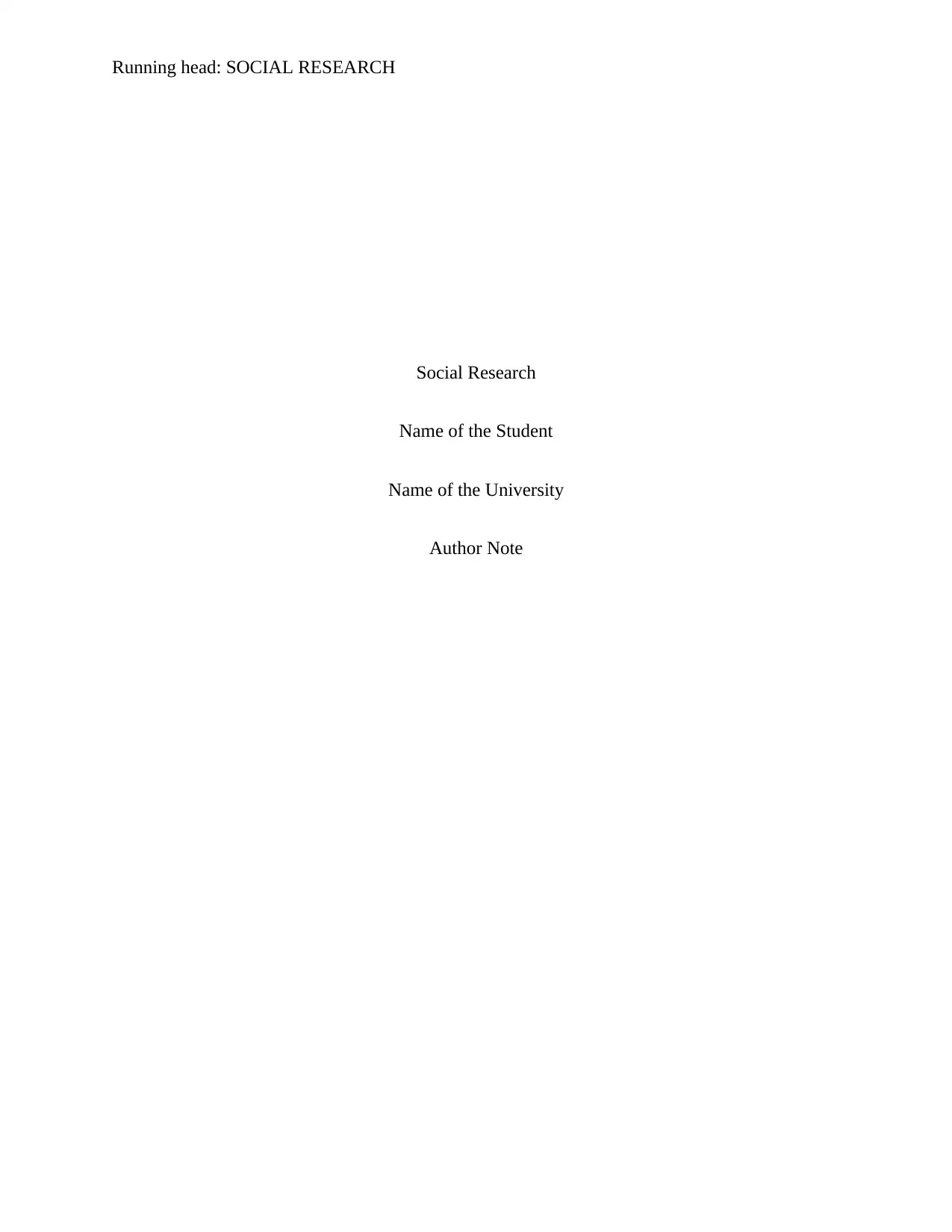
Running head: SOCIAL RESEARCH
Social Research
Name of the Student
Name of the University
Author Note
Social Research
Name of the Student
Name of the University
Author Note
Paraphrase This Document
Need a fresh take? Get an instant paraphrase of this document with our AI Paraphraser
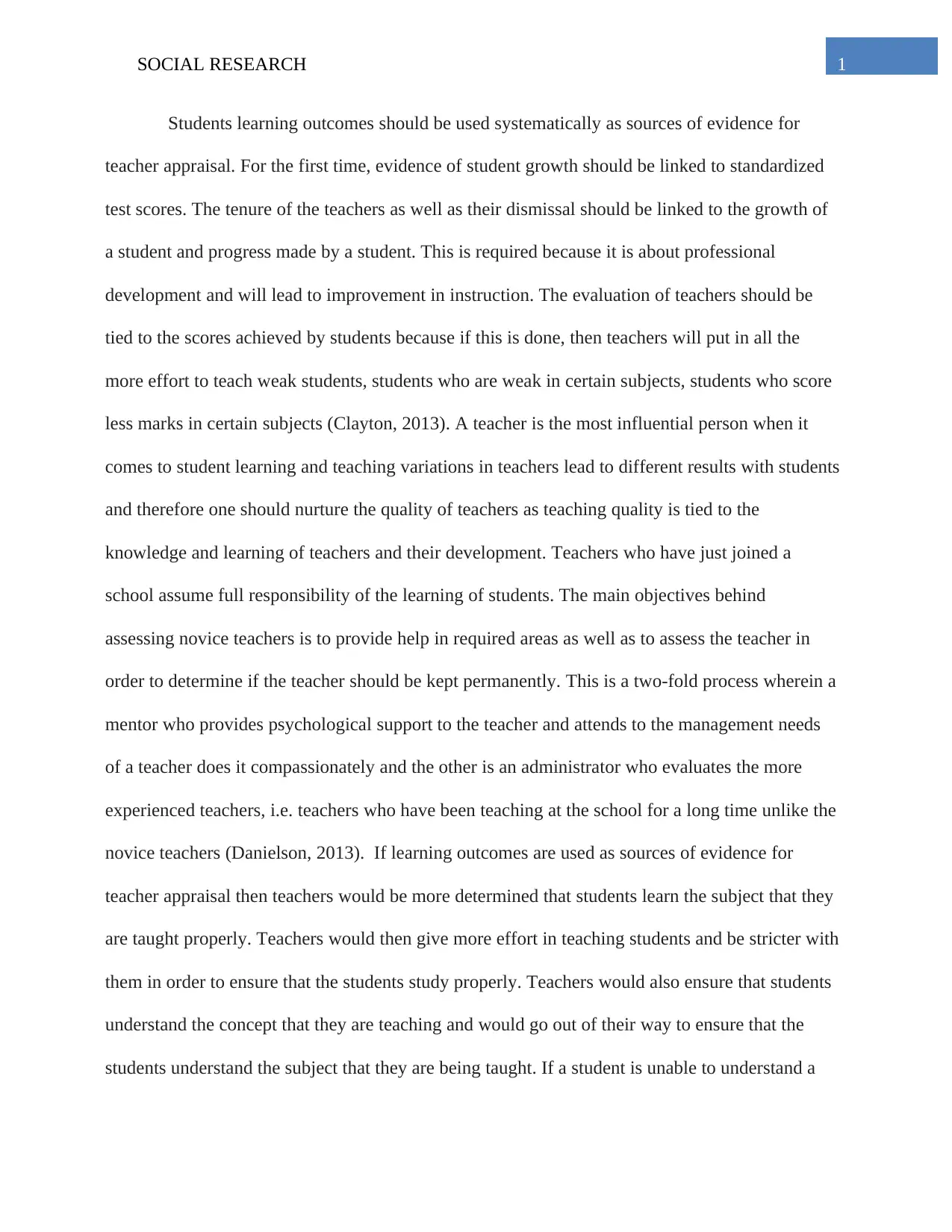
1SOCIAL RESEARCH
Students learning outcomes should be used systematically as sources of evidence for
teacher appraisal. For the first time, evidence of student growth should be linked to standardized
test scores. The tenure of the teachers as well as their dismissal should be linked to the growth of
a student and progress made by a student. This is required because it is about professional
development and will lead to improvement in instruction. The evaluation of teachers should be
tied to the scores achieved by students because if this is done, then teachers will put in all the
more effort to teach weak students, students who are weak in certain subjects, students who score
less marks in certain subjects (Clayton, 2013). A teacher is the most influential person when it
comes to student learning and teaching variations in teachers lead to different results with students
and therefore one should nurture the quality of teachers as teaching quality is tied to the
knowledge and learning of teachers and their development. Teachers who have just joined a
school assume full responsibility of the learning of students. The main objectives behind
assessing novice teachers is to provide help in required areas as well as to assess the teacher in
order to determine if the teacher should be kept permanently. This is a two-fold process wherein a
mentor who provides psychological support to the teacher and attends to the management needs
of a teacher does it compassionately and the other is an administrator who evaluates the more
experienced teachers, i.e. teachers who have been teaching at the school for a long time unlike the
novice teachers (Danielson, 2013). If learning outcomes are used as sources of evidence for
teacher appraisal then teachers would be more determined that students learn the subject that they
are taught properly. Teachers would then give more effort in teaching students and be stricter with
them in order to ensure that the students study properly. Teachers would also ensure that students
understand the concept that they are teaching and would go out of their way to ensure that the
students understand the subject that they are being taught. If a student is unable to understand a
Students learning outcomes should be used systematically as sources of evidence for
teacher appraisal. For the first time, evidence of student growth should be linked to standardized
test scores. The tenure of the teachers as well as their dismissal should be linked to the growth of
a student and progress made by a student. This is required because it is about professional
development and will lead to improvement in instruction. The evaluation of teachers should be
tied to the scores achieved by students because if this is done, then teachers will put in all the
more effort to teach weak students, students who are weak in certain subjects, students who score
less marks in certain subjects (Clayton, 2013). A teacher is the most influential person when it
comes to student learning and teaching variations in teachers lead to different results with students
and therefore one should nurture the quality of teachers as teaching quality is tied to the
knowledge and learning of teachers and their development. Teachers who have just joined a
school assume full responsibility of the learning of students. The main objectives behind
assessing novice teachers is to provide help in required areas as well as to assess the teacher in
order to determine if the teacher should be kept permanently. This is a two-fold process wherein a
mentor who provides psychological support to the teacher and attends to the management needs
of a teacher does it compassionately and the other is an administrator who evaluates the more
experienced teachers, i.e. teachers who have been teaching at the school for a long time unlike the
novice teachers (Danielson, 2013). If learning outcomes are used as sources of evidence for
teacher appraisal then teachers would be more determined that students learn the subject that they
are taught properly. Teachers would then give more effort in teaching students and be stricter with
them in order to ensure that the students study properly. Teachers would also ensure that students
understand the concept that they are teaching and would go out of their way to ensure that the
students understand the subject that they are being taught. If a student is unable to understand a
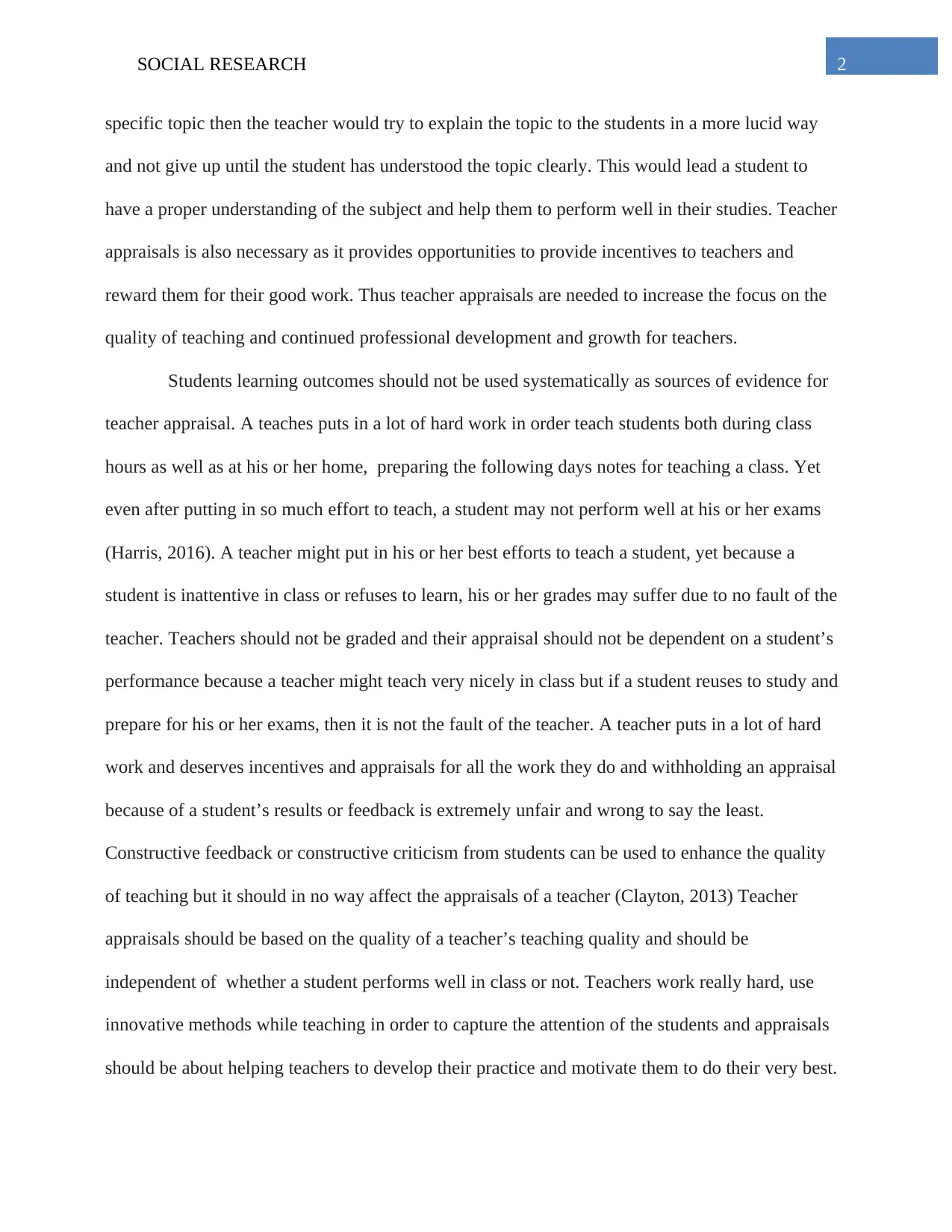
2SOCIAL RESEARCH
specific topic then the teacher would try to explain the topic to the students in a more lucid way
and not give up until the student has understood the topic clearly. This would lead a student to
have a proper understanding of the subject and help them to perform well in their studies. Teacher
appraisals is also necessary as it provides opportunities to provide incentives to teachers and
reward them for their good work. Thus teacher appraisals are needed to increase the focus on the
quality of teaching and continued professional development and growth for teachers.
Students learning outcomes should not be used systematically as sources of evidence for
teacher appraisal. A teaches puts in a lot of hard work in order teach students both during class
hours as well as at his or her home, preparing the following days notes for teaching a class. Yet
even after putting in so much effort to teach, a student may not perform well at his or her exams
(Harris, 2016). A teacher might put in his or her best efforts to teach a student, yet because a
student is inattentive in class or refuses to learn, his or her grades may suffer due to no fault of the
teacher. Teachers should not be graded and their appraisal should not be dependent on a student’s
performance because a teacher might teach very nicely in class but if a student reuses to study and
prepare for his or her exams, then it is not the fault of the teacher. A teacher puts in a lot of hard
work and deserves incentives and appraisals for all the work they do and withholding an appraisal
because of a student’s results or feedback is extremely unfair and wrong to say the least.
Constructive feedback or constructive criticism from students can be used to enhance the quality
of teaching but it should in no way affect the appraisals of a teacher (Clayton, 2013) Teacher
appraisals should be based on the quality of a teacher’s teaching quality and should be
independent of whether a student performs well in class or not. Teachers work really hard, use
innovative methods while teaching in order to capture the attention of the students and appraisals
should be about helping teachers to develop their practice and motivate them to do their very best.
specific topic then the teacher would try to explain the topic to the students in a more lucid way
and not give up until the student has understood the topic clearly. This would lead a student to
have a proper understanding of the subject and help them to perform well in their studies. Teacher
appraisals is also necessary as it provides opportunities to provide incentives to teachers and
reward them for their good work. Thus teacher appraisals are needed to increase the focus on the
quality of teaching and continued professional development and growth for teachers.
Students learning outcomes should not be used systematically as sources of evidence for
teacher appraisal. A teaches puts in a lot of hard work in order teach students both during class
hours as well as at his or her home, preparing the following days notes for teaching a class. Yet
even after putting in so much effort to teach, a student may not perform well at his or her exams
(Harris, 2016). A teacher might put in his or her best efforts to teach a student, yet because a
student is inattentive in class or refuses to learn, his or her grades may suffer due to no fault of the
teacher. Teachers should not be graded and their appraisal should not be dependent on a student’s
performance because a teacher might teach very nicely in class but if a student reuses to study and
prepare for his or her exams, then it is not the fault of the teacher. A teacher puts in a lot of hard
work and deserves incentives and appraisals for all the work they do and withholding an appraisal
because of a student’s results or feedback is extremely unfair and wrong to say the least.
Constructive feedback or constructive criticism from students can be used to enhance the quality
of teaching but it should in no way affect the appraisals of a teacher (Clayton, 2013) Teacher
appraisals should be based on the quality of a teacher’s teaching quality and should be
independent of whether a student performs well in class or not. Teachers work really hard, use
innovative methods while teaching in order to capture the attention of the students and appraisals
should be about helping teachers to develop their practice and motivate them to do their very best.
⊘ This is a preview!⊘
Do you want full access?
Subscribe today to unlock all pages.

Trusted by 1+ million students worldwide
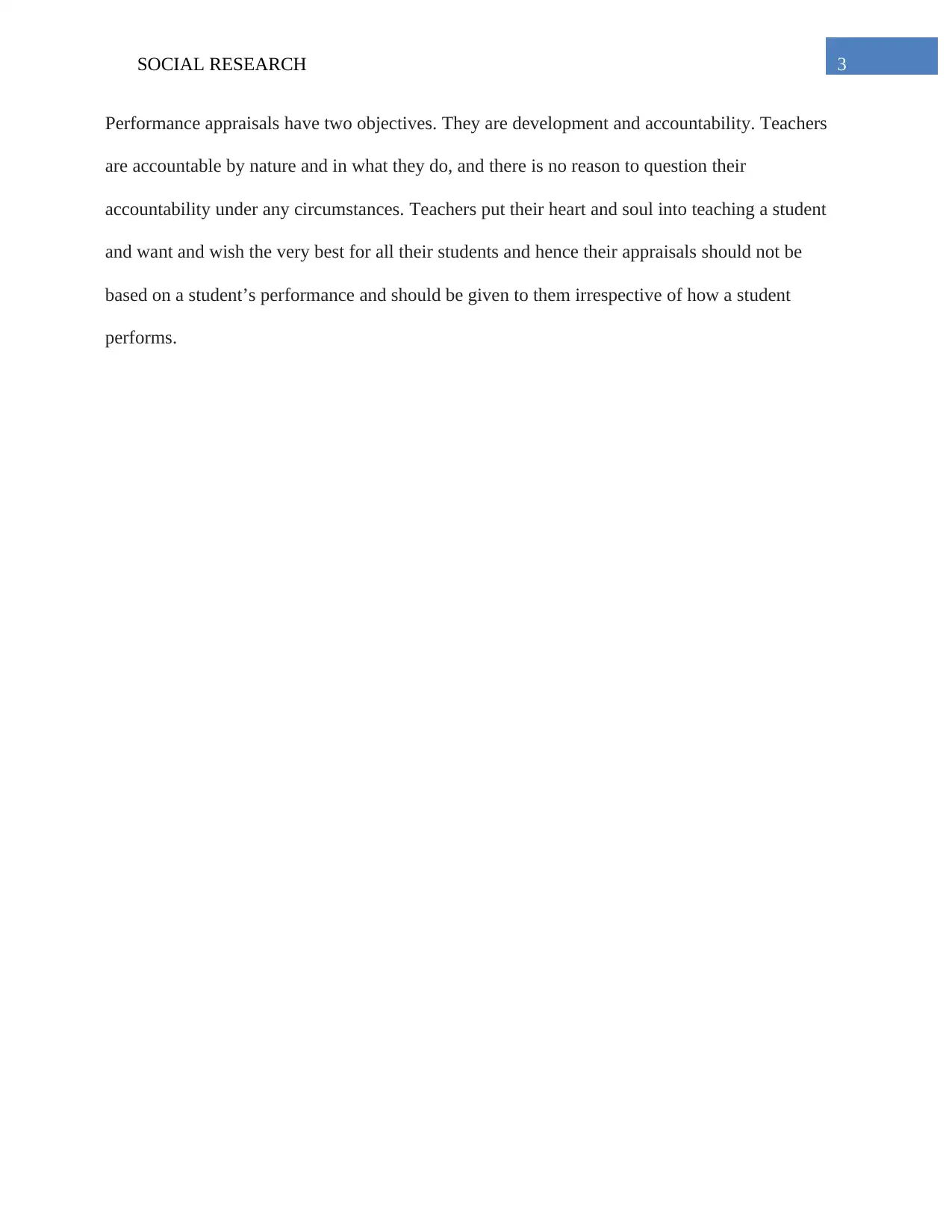
3SOCIAL RESEARCH
Performance appraisals have two objectives. They are development and accountability. Teachers
are accountable by nature and in what they do, and there is no reason to question their
accountability under any circumstances. Teachers put their heart and soul into teaching a student
and want and wish the very best for all their students and hence their appraisals should not be
based on a student’s performance and should be given to them irrespective of how a student
performs.
Performance appraisals have two objectives. They are development and accountability. Teachers
are accountable by nature and in what they do, and there is no reason to question their
accountability under any circumstances. Teachers put their heart and soul into teaching a student
and want and wish the very best for all their students and hence their appraisals should not be
based on a student’s performance and should be given to them irrespective of how a student
performs.
Paraphrase This Document
Need a fresh take? Get an instant paraphrase of this document with our AI Paraphraser
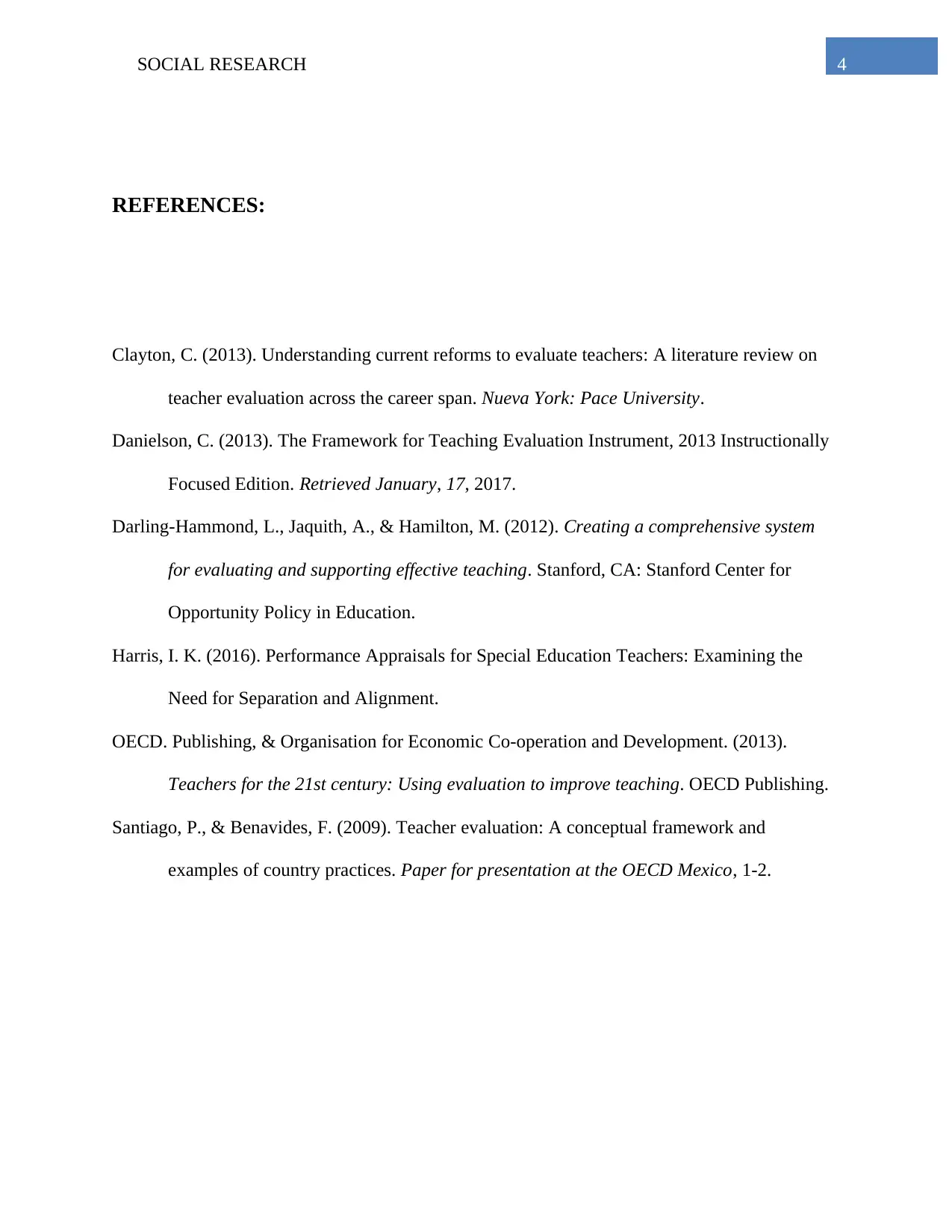
4SOCIAL RESEARCH
REFERENCES:
Clayton, C. (2013). Understanding current reforms to evaluate teachers: A literature review on
teacher evaluation across the career span. Nueva York: Pace University.
Danielson, C. (2013). The Framework for Teaching Evaluation Instrument, 2013 Instructionally
Focused Edition. Retrieved January, 17, 2017.
Darling-Hammond, L., Jaquith, A., & Hamilton, M. (2012). Creating a comprehensive system
for evaluating and supporting effective teaching. Stanford, CA: Stanford Center for
Opportunity Policy in Education.
Harris, I. K. (2016). Performance Appraisals for Special Education Teachers: Examining the
Need for Separation and Alignment.
OECD. Publishing, & Organisation for Economic Co-operation and Development. (2013).
Teachers for the 21st century: Using evaluation to improve teaching. OECD Publishing.
Santiago, P., & Benavides, F. (2009). Teacher evaluation: A conceptual framework and
examples of country practices. Paper for presentation at the OECD Mexico, 1-2.
REFERENCES:
Clayton, C. (2013). Understanding current reforms to evaluate teachers: A literature review on
teacher evaluation across the career span. Nueva York: Pace University.
Danielson, C. (2013). The Framework for Teaching Evaluation Instrument, 2013 Instructionally
Focused Edition. Retrieved January, 17, 2017.
Darling-Hammond, L., Jaquith, A., & Hamilton, M. (2012). Creating a comprehensive system
for evaluating and supporting effective teaching. Stanford, CA: Stanford Center for
Opportunity Policy in Education.
Harris, I. K. (2016). Performance Appraisals for Special Education Teachers: Examining the
Need for Separation and Alignment.
OECD. Publishing, & Organisation for Economic Co-operation and Development. (2013).
Teachers for the 21st century: Using evaluation to improve teaching. OECD Publishing.
Santiago, P., & Benavides, F. (2009). Teacher evaluation: A conceptual framework and
examples of country practices. Paper for presentation at the OECD Mexico, 1-2.
1 out of 5
Related Documents
Your All-in-One AI-Powered Toolkit for Academic Success.
+13062052269
info@desklib.com
Available 24*7 on WhatsApp / Email
![[object Object]](/_next/static/media/star-bottom.7253800d.svg)
Unlock your academic potential
Copyright © 2020–2026 A2Z Services. All Rights Reserved. Developed and managed by ZUCOL.





